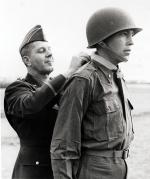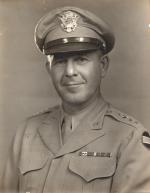![header=[Marker Text] body=[Born and raised here, he rose to the rank of Four Star General, 1945. The Army's youngest Brig. Gen. In 1940, he became commander of European operations in World War II and had a key role in the liberation of France, 1944. Buried, Arlington National Cemetery. ] sign](http://explorepahistory.com/kora/files/1/10/1-A-2E0-139-ExplorePAHistory-a0k4q1-a_450.jpg)
Mouse over for marker text
Name:
Jacob L. Devers
Region:
Hershey/Gettysburg/Dutch Country Region
County:
York
Marker Location:
254 Roosevelt Avenue, York
Dedication Date:
June 26, 1999
Behind the Marker
Jacob Loucks Devers is not a name remembered by most Americans today. But, by the end of the war in Europe in 1945, General Devers commanded an army group that made him equal in status to General Eisenhower's two other army group leaders, the British Field Marshall Bernard Montgomery and American Lieutenant General Omar Bradley.
Born in York in 1887, Jacob Devers distinguished himself at York High School as captain of its basketball team. He then entered West Point and, after graduating 39th in the 103-man class of 1909, began his professional military career as a field artillery officer. During World War I, he was disappointed when he was retained in America to train artillery units rather than go to France and fight the Germans. He eventually did go to Europe on occupation duty, and, after his return to the States, performed a variety of assignments. In the 1930s, his seemingly boundless energy and interest in newer armored tactics drew the attention of his superiors.
In May 1940, President Franklin D. Roosevelt selected Colonel Devers as the senior member of a board formed to locate the bases that Great Britain would grant to the United States in the Lend-Lease exchange for fifty obsolete American destroyers. A year later, Genera George C. Marshall picked Devers to command the armored forces training center at Fort Knox, Kentucky. Here, the new general had the opportunity to make final improvements to the new Sherman medium tank, and to work with future armored leaders in developing tactics for the rapidly enlarging American army that Marshall was forming. Devers' behind-the-scenes work would have a tremendous impact when American armored forces played a key role in the Allied attack on Nazi Germany.
George C. Marshall picked Devers to command the armored forces training center at Fort Knox, Kentucky. Here, the new general had the opportunity to make final improvements to the new Sherman medium tank, and to work with future armored leaders in developing tactics for the rapidly enlarging American army that Marshall was forming. Devers' behind-the-scenes work would have a tremendous impact when American armored forces played a key role in the Allied attack on Nazi Germany.
In May 1943, Devers was again promoted and sent to England as the commander of American forces in Europe. It was his job to continue the training and organizing the American troops gathering in England to take part in future operations against Germany. By the end of 1943, Devers replaced Dwight D. Eisenhower as deputy commander of the Mediterranean theater, who went to England to command the projected attack on German-occupied France.
Dwight D. Eisenhower as deputy commander of the Mediterranean theater, who went to England to command the projected attack on German-occupied France.
Devers finally received his opportunity to see combat, in August 1944, when thousands of American, French, and British troops surged ashore in France's south coast in Operation Dragoon. General Devers had overall command of this drive as commander of the newly formed Sixth Army Group, which included the American Seventh Army and the French First Army. Overwhelming light German opposition, French and American troops headed north up the Rhone River valley, driving Germans before them. By the end of 1944, Devers' advance had reached the Rhine River and effectively freed much of southern and southeastern France from Nazi occupation.
When the Allies crossed the Rhine in March 1945, Devers' army group raced east and then south to Bavaria, where they occupied Stuttgart, Nuremberg, Munich, and Hitler's nest at Berchtesgaden by the end of the fighting in May. Along the way his troops also liberated the Nazi concentration camp at Dachau. Appalled at the horrors he discovered there, an infuriated Devers remarked, "We've got to destroy the Gestapo type of mentality. We've got to shoot them, although I guess, of course, we have got to do it legally."
General Devers then was assigned command of Army Ground Forces, a thankless job that involved training and administering the troops that remained in the army, a position he held until his retirement in 1949. Devers was not a flamboyant commander like George Patton, nor did he seek publicity. He was, however, a highly competent officer whose impartiality and ability to work with both British and French commanders prevented the divisions that might otherwise have undermined the effectiveness of the Sixth Army Groups advance into Germany during the final year of the war.
After retiring from the Army in 1949, Devers lived outside of Washington, D.C., until his death in 1979.
Born in York in 1887, Jacob Devers distinguished himself at York High School as captain of its basketball team. He then entered West Point and, after graduating 39th in the 103-man class of 1909, began his professional military career as a field artillery officer. During World War I, he was disappointed when he was retained in America to train artillery units rather than go to France and fight the Germans. He eventually did go to Europe on occupation duty, and, after his return to the States, performed a variety of assignments. In the 1930s, his seemingly boundless energy and interest in newer armored tactics drew the attention of his superiors.
In May 1940, President Franklin D. Roosevelt selected Colonel Devers as the senior member of a board formed to locate the bases that Great Britain would grant to the United States in the Lend-Lease exchange for fifty obsolete American destroyers. A year later, Genera
In May 1943, Devers was again promoted and sent to England as the commander of American forces in Europe. It was his job to continue the training and organizing the American troops gathering in England to take part in future operations against Germany. By the end of 1943, Devers replaced
Devers finally received his opportunity to see combat, in August 1944, when thousands of American, French, and British troops surged ashore in France's south coast in Operation Dragoon. General Devers had overall command of this drive as commander of the newly formed Sixth Army Group, which included the American Seventh Army and the French First Army. Overwhelming light German opposition, French and American troops headed north up the Rhone River valley, driving Germans before them. By the end of 1944, Devers' advance had reached the Rhine River and effectively freed much of southern and southeastern France from Nazi occupation.
When the Allies crossed the Rhine in March 1945, Devers' army group raced east and then south to Bavaria, where they occupied Stuttgart, Nuremberg, Munich, and Hitler's nest at Berchtesgaden by the end of the fighting in May. Along the way his troops also liberated the Nazi concentration camp at Dachau. Appalled at the horrors he discovered there, an infuriated Devers remarked, "We've got to destroy the Gestapo type of mentality. We've got to shoot them, although I guess, of course, we have got to do it legally."
General Devers then was assigned command of Army Ground Forces, a thankless job that involved training and administering the troops that remained in the army, a position he held until his retirement in 1949. Devers was not a flamboyant commander like George Patton, nor did he seek publicity. He was, however, a highly competent officer whose impartiality and ability to work with both British and French commanders prevented the divisions that might otherwise have undermined the effectiveness of the Sixth Army Groups advance into Germany during the final year of the war.
After retiring from the Army in 1949, Devers lived outside of Washington, D.C., until his death in 1979.






